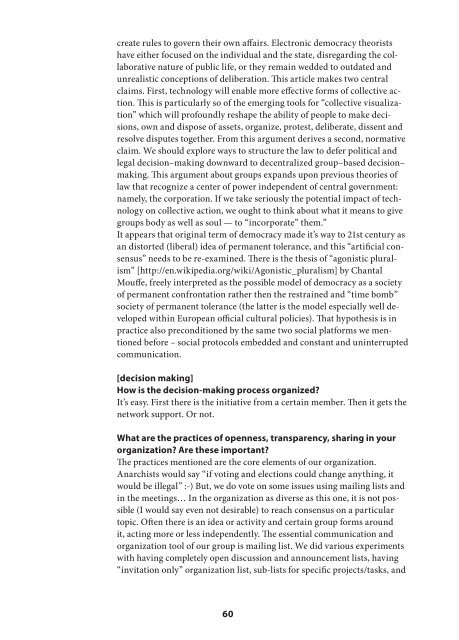You also want an ePaper? Increase the reach of your titles
YUMPU automatically turns print PDFs into web optimized ePapers that Google loves.
create rules to govern their own affairs. Electronic democracy theorists<br />
have either focused on the individual and the state, disregarding the collaborative<br />
nature of public life, or they remain wedded to outdated and<br />
unrealistic conceptions of deliberation. This article makes two central<br />
claims. First, technology will enable more effective forms of collective action.<br />
This is particularly so of the emerging tools for “collective visualization”<br />
which will profoundly reshape the ability of people to make decisions,<br />
own and dispose of assets, organize, protest, deliberate, dissent and<br />
resolve disputes together. From this argument derives a second, normative<br />
claim. We should explore ways to structure the law to defer political and<br />
legal decision–making downward to decentralized group–based decision–<br />
making. This argument about groups expands upon previous theories of<br />
law that recognize a center of power independent of central government:<br />
namely, the corporation. If we take seriously the potential impact of technology<br />
on collective action, we ought to think about what it means to give<br />
groups body as well as soul — to “incorporate” them.”<br />
It appears that original term of democracy made it’s way to 21st century as<br />
an distorted (liberal) idea of permanent tolerance, and this “artificial consensus”<br />
needs to be re-examined. There is the thesis of “agonistic pluralism”<br />
[http://en.wikipedia.org/wiki/Agonistic_pluralism] by Chantal<br />
Mouffe, freely interpreted as the possible model of democracy as a society<br />
of permanent confrontation rather then the restrained and “time bomb”<br />
society of permanent tolerance (the latter is the model especially well developed<br />
within European official cultural policies). That hypothesis is in<br />
practice also preconditioned by the same two social platforms we mentioned<br />
before – social protocols embedded and constant and uninterrupted<br />
communication.<br />
[decision making]<br />
How is the decision-making process organized?<br />
It’s easy. First there is the initiative from a certain member. Then it gets the<br />
network support. Or not.<br />
What are the practices of openness, transparency, sharing in your<br />
organization? Are these important?<br />
The practices mentioned are the core elements of our organization.<br />
Anarchists would say “if voting and elections could change anything, it<br />
would be illegal” :-) But, we do vote on some issues using mailing lists and<br />
in the meetings… In the organization as diverse as this one, it is not possible<br />
(I would say even not desirable) to reach consensus on a particular<br />
topic. Often there is an idea or activity and certain group forms around<br />
it, acting more or less independently. The essential communication and<br />
organization tool of our group is mailing list. We did various experiments<br />
with having completely open discussion and announcement lists, having<br />
“invitation only” organization list, sub-lists for specific projects/tasks, and<br />
60


